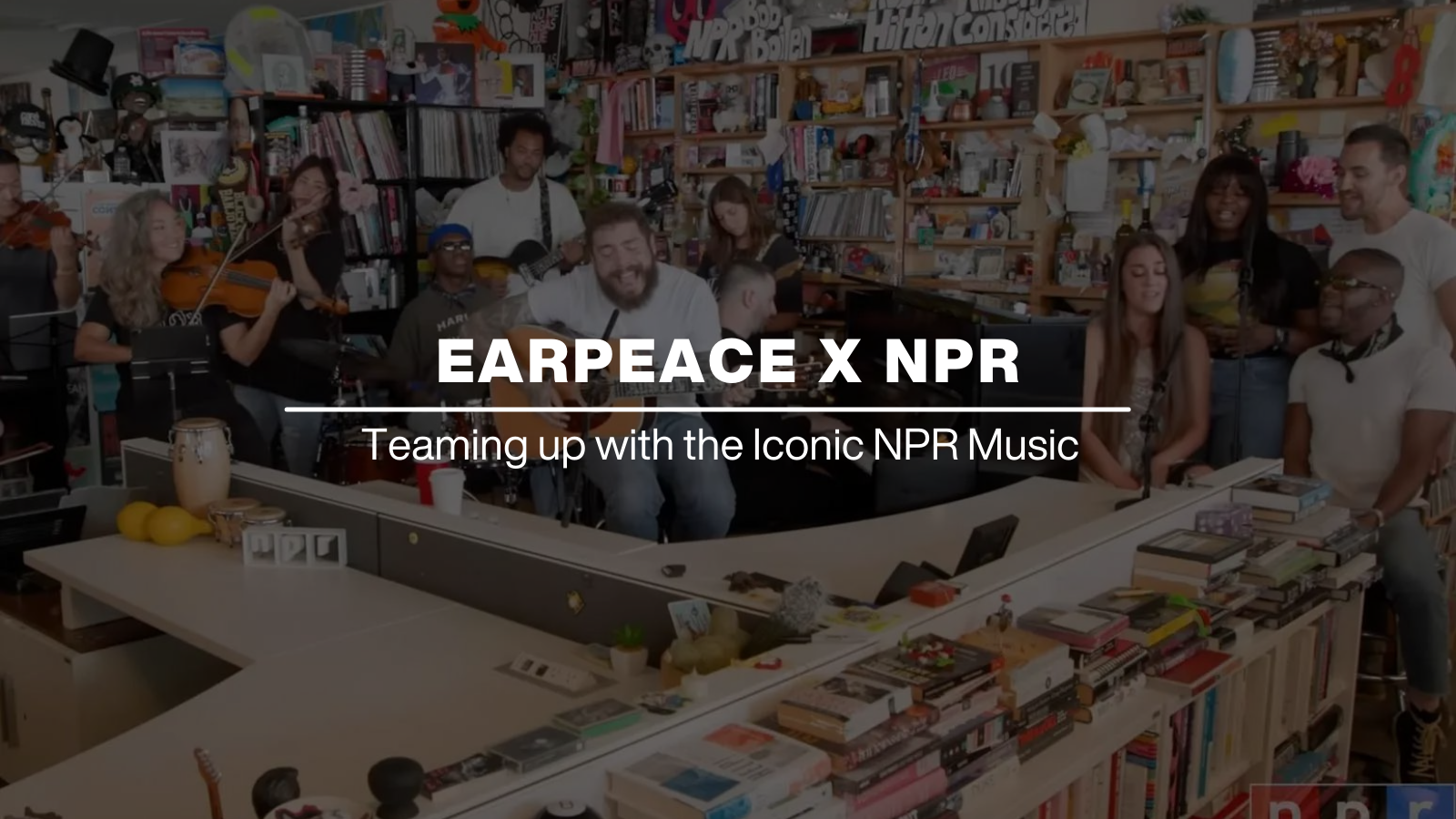NPR Selects EarPeace for Custom Hearing Protection to Reduce Noise Induced Hearing Loss Amongst Artists and Music Fans
Here at EarPeace, we are excited to announce we were selected by National Public Radio (NPR) to create a line of custom branded earplugs in order to reduce noise-induced hearing loss (NIHL) amongst artists and music fans.
Starting with NPR Music, EarPeace is now the official licensed provider of hearing protection for NPR properties including iconic shows like Tiny Desk Concerts, Alt. Latino, and All Songs Considered. For the collaboration, NPR x EarPeace will include the newly patented EarPeace PRO MUSIC earplugs. EarPeace PRO features a contoured design that conforms to the natural shape of the ear canal. Combined with the finely tuned acoustic mesh filter that precisely replicates the sound signature, PRO delivers a true-to-life audio experience at a safe volume for discerning artists and music fans.
“I am a native Washingtonian and die-hard NPR fan. Chances are 50/50 whether I’m listening to music or the dulcet tones of NPR news keeping me informed. Working with NPR to keep the community’s hearing healthy is a profound honor,” said Jay Clark, Founder and CEO of EarPeace. “When I first launched EarPeace, one of the first people I approached to test drive the plugs was Bob Boilen. If anyone knows live shows and the subtlety of music, it’s Bob.”
For more than a decade, NPR Music's robust music journalism and award-winning original video programming has delighted millions of music fans from all genres. NPR Music collaborates across NPR's programming, public radio Member stations and the passionate listener community to celebrate exceptional music and discover emerging artists. Tiny Desk, NPR’s intimate studio concert series, has been an iconic part of NPR Music since 2008. A celebrated format, the show consists of a video series of live concerts and was created by Bob Boilen, Host of All Songs Considered. Boilen has been responsible for the show’s widespread success, allowing viewers to feel as up close and raw as the performers. As everything in music becomes more produced, Tiny Desk has provided a respite in the culture, revitalizing audiences with it’s compelling, authentic performances.
“I have loved EarPeace earplugs and have used them literally at over a thousand shows. My ears thank you,” stated Bob Boilen, Creator/Host of All Songs Considered and Tiny Desk Concerts.

According to the Centers for Disease Control and Prevention (CDC), in less than five minutes at a rock concert, noise induced hearing loss has already begun. In the past year, roughly 25 million Americans have experienced tinnitus. As a result, hearing loss remains the third most common chronic physical condition in the United States and is twice as prevalent as diabetes or cancer.*
“Unless I’m mixing and recording at the Tiny Desk, I’m using hearing protection at concerts. EarPeace has been my go-to for years. Do your future self a favor and use them,” Josh Rogosin, Tiny Desk Audio Engineer and Technical Director for NPR Music, who, even prior to the collaboration with EarPeace, has been an advocate for safe listening with hearing protection.
Recently granted their second patent for the proprietary design of their earplugs following their utility patent, PRO resolves a common problem in traditional earplugs that contain rigid components by eliminating the mismatch between the shape of the ear and plug. The earplugs use less material to optimally expand in the ear canal, minimizing unwanted bunching and slit leaks. In addition to the higher level of comfort, the oval, offset wave shape of their patented design permits the filters to perform at peak capacity.
On a mission to save the world's hearing and prevent Noise Induced Hearing Loss (NIHL), we haven't stopped at revolutionizing hearing protection options – they continue to lead the change in how people value their hearing health as well as efforts to reduce the epidemic of hearing loss and tinnitus. We are trusted by NPR, Metallica, RedBull, and more.
*Based on calculations performed by NIDCD Epidemiology and Statistics Program staff: (1) tinnitus prevalence was obtained from the 2008 National Health Interview Survey (NHIS); (2) the estimated number of American adults reporting tinnitus was calculated by multiplying the prevalence of tinnitus by the 2013 U.S. Census population estimate for the number of adults (18+ years of age)(Blackwell DL, Lucas JW, Clarke TC. Summary health statistics for US adults: National Health Interview Survey, 2012. Vital Health Stat 10. 2014;260:1-161.)




Share:
EARPEACE PATENTS